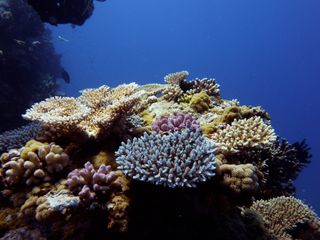Study: Corals Reefs Likely to Survive Climate Change

Some species of coral will be winners and others losers as ocean temperatures rise, a new study suggests.
The research highlights the complexity of the changes that global warming is likely to have on ocean habitats. And which corals thrive and which struggle could determine what the coral reefs of the future look like.
"The good news is that, rather than experiencing wholesale destruction, many coral reefs will survive climate change by changing the mix of coral species as the ocean warms and becomes more acidic," Terry Hughes, a researcher at James Cook University in Australia, said in a statement. "That's important for people who rely on the rich and beautiful coral reefs of today for food, tourism and other livelihoods."
Most studies of changing coral reefs have used the relatively crude measure of total coral cover to gauge the health of reefs. Hughes and his colleagues wanted to get more detail and to understand how the composition, not just the total size, of the coral changes in different conditions. [Virtual Dive: Colorful Coral Photos]
The researchers examined more than 35,000 coral colonies along Australia's Great Barrier Reef. The sites studied were up to 1,081 miles (1,740 kilometers) apart.
"We chose the iconic Great Barrier Reef as our natural laboratory because water temperature varies by 8 to 9 degrees Celsius (14.4 to 16.2 degrees Fahrenheit) along its full length from summer to winter, and because there are wide local variations in pH [a measure of acidity]," Hughes said. "Its regional-scale natural gradients encompass the sorts of conditions that will apply several decades from now under business-as-usual greenhouse gas emissions."
The results revealed "surprisingly flexible" assemblies of corals along the reef and in different environments within the reef, the researchers reported Thursday (April 12) in the journal Current Biology. For example, on the crests of the reef, nine of the 12 major scientific groupings found varied widely from region to region. Species colonizing reef crests likewise varied from reef slopes.
Sign up for the Live Science daily newsletter now
Get the world’s most fascinating discoveries delivered straight to your inbox.
Earlier research has shown that corals' survival could depend on the presence of warm-water genes. Some solitary coral can survive in extremely acidic submarine springs, but these coral look very different from the iconic reef-building types known today.
The ultimate effects of climate change could mean that the reefs of the future look very different than the ones of today. For example, if branching corals were replaced by moundlike corals, fish would have fewer nooks and crannies for shelter, Hughes said. But the findings also indicate the reefs will ultimately survive climate change in some form — if something else doesn't kill them off first.
"Coral reefs are also threatened by much more local impacts, especially by pollution and overfishing," Hughes said. "We need to address all of the threats, including climate change, to give coral reefs a fighting chance for the future."
You can follow LiveScience senior writer Stephanie Pappas on Twitter @sipappas. Follow LiveScience for the latest in science news and discoveries on Twitter @livescience and on Facebook.

Stephanie Pappas is a contributing writer for Live Science, covering topics ranging from geoscience to archaeology to the human brain and behavior. She was previously a senior writer for Live Science but is now a freelancer based in Denver, Colorado, and regularly contributes to Scientific American and The Monitor, the monthly magazine of the American Psychological Association. Stephanie received a bachelor's degree in psychology from the University of South Carolina and a graduate certificate in science communication from the University of California, Santa Cruz.
Most Popular



